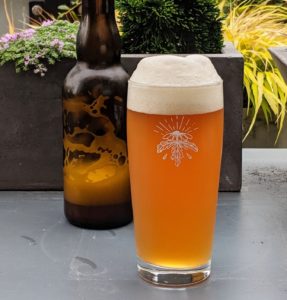Brew date: February 3, 2019
Bottling date: March 11, 2019
This is one of those rare brews where I try to emulate a BJCP style properly. Well, at least with half of the batch: the other half will be conditioned for an extended period with a blend of brettanomyces. The style is 24B, Belgian pale ale. I’ve built out a blank page recipe based on some reading as well as the BJCP guidelines. As usual, I am going with Weyermann Bohemian pilsner malt for the base, and added in a healthy dose of Weyermann Munich II (9L) malt as well. I am not adding sugar, but instead targeting a very fermentable wort for a dry finish. I hope that the oats will allow the body to remain medium to medium-low with the dry finish.
For water profile, I went light on the salts using Brewer’s Friend ‘Light and malty’ profile as a starting point. My additions below should provide about 60 ppm Ca, 42 ppm SO4, and 75 ppm Cl.
Target OG: 1.050 Target FG: 1.009
Actual OG: 1.047 Actual FG: 1.012
IBU: 28 ABV: 4.7%
Batch size: 19L (into fermentor)
BHE: 73%
Water Adjustments (add to mash):
4g CaCl
2g gypsum
2.5g 88% lactic acid to each mash & sparge waters
Mash steps:
131F dough in with 16L water
148F for 45 min
152F for 25 min
161F for 20 min
170F mash out, sparge 13.5L of 170F water
Boil 90 minutes
Grist:
3.00 kg Bohemian Pilsner (Weyermann) [69.4%]
0.80 kg Munich II Dark (Weyermann) [18.5%]
0.20 kg Flaked oats [4.6%]
0.16 kg Victory malt (Briess) [3.7%]
0.16 kg Caramunich II (Weyermann) [3.7%]
Hopping:
18.3 AAU Hallertau Tradition @ 60 min [28g]
7.6 AAU Czech Saaz @ 15 min [28g]
Other:
1/2 tablet Whirfloc @ 15 min
1/2 tsp yeast nutrient @ 15 min
Fermentation:
Imperial Yeast B53 – Precious
Pitch @ 57F
First 48 hrs at 66F
Next 48 hrs 68F
Next 48 hrs 72F
Condition 50F for 2 weeks
Bottle condition to 3.0 vols
Above: Kombi Deluxe, the dry-hopped, brett conditioned version.
Brew Day Notes:
Mashed in @ 3:55 pm, much later brew day than usual. Held 131F until 4:10 then increased to 148F and headed out for groceries. Raised to 152F at 4:50, started heating sparge water. Added 1/2 tsp CaCl and 1/4 tsp gypsum to mash water, half those volumes to sparge water. 2.5ml 88% L.A. into mash water, none in sparge water. 161F setpoint at 5:25, 170F at 5:45. Mashed out with 13.5L of 170F water, drained pretty quick – sparge took about 15 mins. Collected just a hair under 27L of 1.042 wort. After 1h 20m volume was still a tad high at 24L so let go an extra 10 minutes.
Bottling Notes:
Despite being a few points shy of my target OG, it still finished 3 points high on my target FG. I attribute much of this to the unfamiliar yeast, as my mash schedule should have produced a pretty fermentable wort. If I go with this yeast again, I’ll likely add a small amount of clear sugar along with a longer rest in the 146-148F range.
Bottled March 11 after a couple weeks in secondary with 85g table sugar for 10.5L (about 3 vols CO2). Instead of my usual technique of pouring the boiled/cooled sugar water into the bottling bucket then racking the beer on top, I bottled direct from the secondary vessel and poured the boiled/cooled sugar water into it (letting sit for 10-15 min). We’ll see how that pans out in terms of even mixing of the priming sugar – I’m a little nervous. [Note: it did not pan out well at all. About 60% of the batch was flat or near flat, while the other half was spot on – surprisingly, no gushers / overcarb]
Tasting Notes / Competitions:
Due to uneven carb, I only entered the clean version in one competition, Vanbrewers Awards 2019. It placed first in the Belgian Ale category, with scores of 36 and 35.

